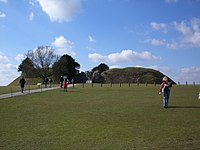Hugh Bardulf
Hugh Bardulf | |
|---|---|
 Modern day view of Old Sarum, where Bardulf had custody of the castle, which no longer exists. | |
| Royal justice | |
| In office c. 1185 – c. 1203 | |
| Baron of the Exchequer | |
| In office c. 1185 – c. 1203 | |
| Personal details | |
| Died | before 1203 |
| Spouse | Mabel |
| Occupation | Judge and administrator |
Hugh Bardulf or Hugh Bardolf (died c. 1203) was a medieval English administrator and royal justice. Known for his legal expertise, he also served as a financial administrator. He served three kings of England before his death.
Bardulf began his royal service under King
Early life
Historians are divided on Hugh Bardulf's ancestry.
Royal service
In 1181, Bardulf was at the court of King Henry II of England, where he was
In 1194, Bardulf was mentioned on the
Under Richard and John
In 1189, Hugh was one of only five sitting sheriffs who retained their office when Richard took the throne; the others included Geoffrey fitzPeter, William Briwerre, and Ranulf de Glanvill.[5] However, in 1189, Bardulf did lose custody of Salisbury Castle, which he had held under Henry.[6] Henry had given Bardulf the manor and barony of Brampton in Devonshire, but when Richard took the throne, the king took back Brampton, and gave Bardulf the manor of Hoo in Kent instead.[7]
Although Bardulf set out with the new King, Richard I on the
Bardulf was also a financial administrator. He served as a
Bardulf continued to serve Richard until the king's death, and then served John, who became king, until sometime before Michaelmas 1203, when records show that Bardulf was known to be deceased.[2]
Legacy and personal life
Bardulf was known for his legal expertise, which led to him being one of the few justices mentioned by name in
The justice married Mabel de Limesy, daughter of Gerard de Limesy, and coheir with her sisters of their brother John de Limesy, with the marriage taking place in 1200. When he died, his heir was Robert Bardulf,[1] his brother.[2] Hugh Bardulf gave land capable of pasturing 500 sheep to Barlings Abbey.[16] Robert, his heir, offered a £1,000 fine to receive the inheritance, and William de Briouze made an identical offer for the right to marry his son to Mabel, Hugh's widow.[2]
After Bardulf's death, a legal case was brought against Bardulf's chaplain and constable, alleging that Bardulf had allowed his two servants to hear a case that should have been heard by the justice. The litigants charged that the two servants had wrongly decided the case, and after hearing the allegations, the royal justices at Westminster agreed and restored the disputed property to the litigants.[17]
Citations
- ^ a b c Keats-Rohan Domesday Descendants p. 162
- ^ a b c d e f g h i j Round "Bardolf, Hugh (d. 1203)" Oxford Dictionary of National Biography
- ^ a b Turner English Judiciary pp. 82–84
- ^ Burton "Bayeux, Osbert de (fl. 1120–1184)" Oxford Dictionary of National Biography
- ^ Turner and Heiser Reign of Richard Lionheart p. 99
- ^ Turner and Heiser Reign of Richard Lionheart p. 104
- ^ Turner English Judiciary pp. 111–112
- ^ Turner and Heiser Reign of Richard Lionheart p. 116
- ^ Gillingham Richard I pp. 270–271
- ^ West Justiciarship in England p. 79
- ^ Mitchell Taxation p. 291
- ^ Turner English Judiciary p. 86
- ^ Richardson and Sayres Governance of Mediaeval England p. 274 and footnote 2
- ^ Bartlett England Under the Norman and Angevin Kings p. 192
- ^ Quoted in Turner English Judiciary p. 121
- ^ Turner "Religious Patronage" Albion p. 9
- ^ Turner "Reputation of Royal Judges" Albion p. 307
References
- ISBN 0-19-822741-8.
- Burton, Janet (2004). "Bayeux, Osbert de (fl. 1120–1184)". Oxford Dictionary of National Biography. Oxford University Press. required)
- ISBN 0-300-07912-5.
- ISBN 0-85115-863-3.
- Mitchell, Sydney Knox (1971). Taxation in Medieval England. Hamden, CT: Archon Books. ISBN 0-208-00956-6.
- Richardson, H. G.; OCLC 504298.
- required)
- Turner, Ralph V. (2008). The English Judiciary in the age of Glanvill and Bracton, c. 1176–1239 (Reprint ed.). Cambridge, UK: Cambridge University Press. ISBN 978-0-521-07242-7.
- Turner, Ralph V. (Spring 1986). "Religious Patronage of Angevin Royal Administrators, c. 1170–1239". JSTOR 4048700.
- Turner, Ralph V. (Winter 1979). "The Reputation of Royal Judges Under the Angevin Kings". JSTOR 4048542.
- Turner, Ralph V.; Heiser, Richard R. (2000). The Reign of Richard Lionheart: Ruler of the Angevin Empire 1189–1199. The Medieval World. Harlow, UK: Longman. ISBN 0-582-25660-7.
- West, Francis (1966). The Justiciarship in England 1066–1232. Cambridge, UK: Cambridge University Press. OCLC 953249.
Further reading
- Clay, C. T. (1966). "Hugh Bardolf the Justice and his Family". Lincolnshire History and Archaeology. 50.
